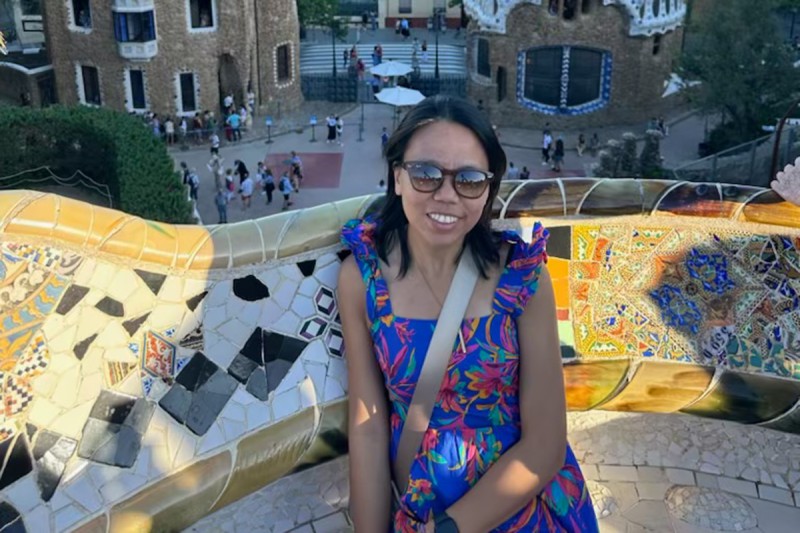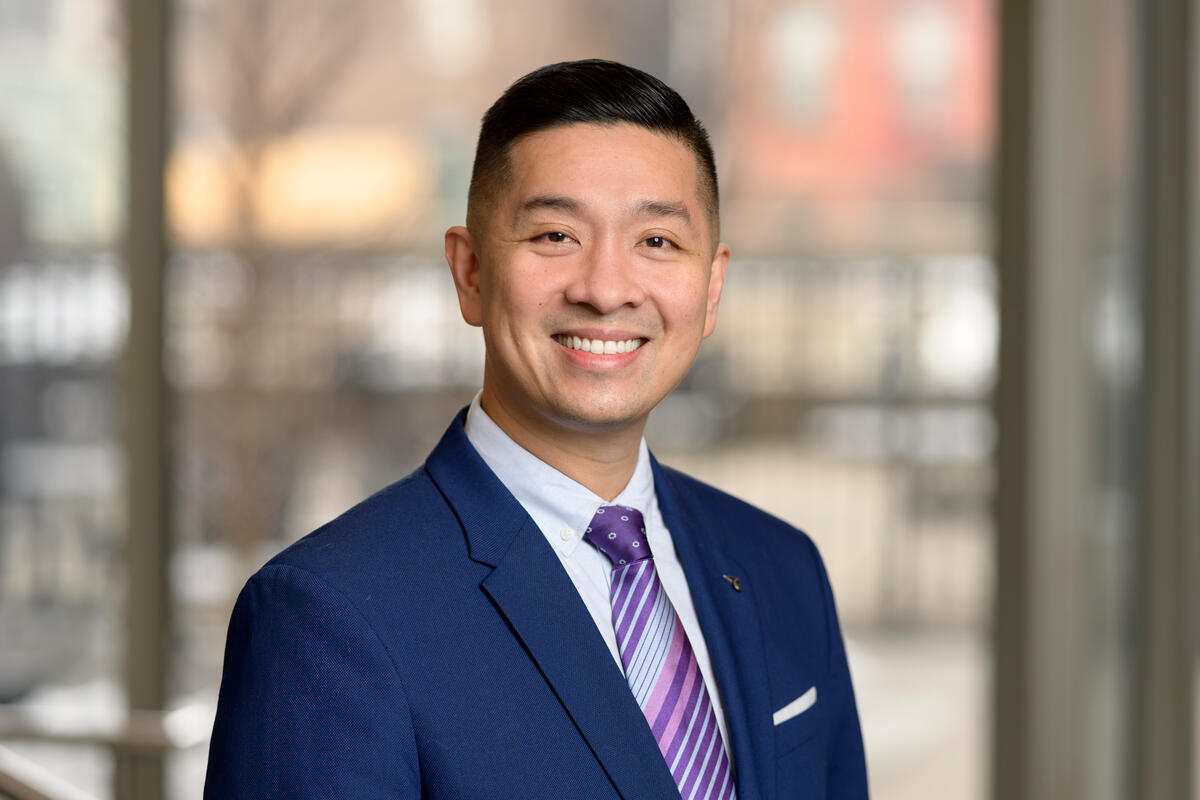
The diagnosis was earth-shattering, especially for someone who had never smoked..
Jhalene Mundin, a 35-year-old mother of two young children, was told in July 2023 that she had stage 4 (metastatic) non-small cell lung cancer. It had spread beyond her lungs and was considered inoperable.
At the time, she was a nurse working at another hospital in Manhattan. A colleague suggested she go straight to Memorial Sloan Kettering Cancer Center (MSK), specifically to see thoracic medical oncologist Alexander Drilon, MD, Chief of MSK’s Early Drug Development Service.
“To me, stage 4 cancer sounded like a death sentence,” Jhalene says. “But from the beginning, Dr. Drilon said I shouldn’t focus on my prognosis. He told me he had patients with the same kind of cancer who had been doing well for more than 10 years. That gave me hope and switched my focus from dying to living.”
Thanks to the treatments she received from Dr. Drilon, Jhalene’s tumors shrank enough for her to have them surgically removed. Today her scans show no substantial evidence of cancer. She is currently receiving chemotherapy to stop her cancer from growing back.
The Symptoms That Led to Stage 4 Lung Cancer Diagnosis
Jhalene’s first symptom of non-small cell lung cancer was a persistent cough that lasted for months. She initially blamed it on the constant colds her children were bringing home from school and, later, on allergies. When a friend finally persuaded her to get a chest X-ray, the image showed a large mass. Follow-up CT and PET scans at the hospital where she works revealed that she had a tumor about the size of a grapefruit on her left lung, as well as smaller tumors in both lungs.
Increasing Lung Cancer in Women and Never-Smokers
While cases of lung cancers have declined overall, there is a disturbing trend among women and people who have never smoked.
Lung cancer is more common in women aged 35 to 54 than it is among men in the same age group, according to a recent study.
What’s more, as the number of smoking-related cancers continues to go down, the overall proportion of lung cancers in nonsmokers is increasing.
“Some 20% of lung cancers that are diagnosed this year and more recently are in never-smokers – and that equates to like 40,000 cases a year,” MSK thoracic oncologist Helena Yu, MD, told CNN in an article about the trend. “About 1 out of 5 people who die of lung cancer now are never-smokers, too.”
How Tumor Genetic Testing Revealed EGFR Mutation and Options for Treatment
Molecular testing of Jhalene’s tumor revealed a mutation in the gene EGFR — one of the most common genetic mutations in non-small cell lung cancer. It’s found in about one-third of cases. It is most frequent in younger women who have never smoked, like Jhalene, and especially in women of Asian descent. Jhalene is from the Philippines and moved to the United States for college.
Thankfully, there are treatment options for EGFR lung cancer.
Easy Access to MSK’s Many Clinical Trials and Other Treatment Options
Jhalene’s story is an example of why where cancer patients are treated first matters. She says she had no trouble making an appointment at MSK.
In their very first meeting, Dr. Drilon told her that, based on the results of the molecular testing, she qualified for two different clinical trials. If she didn’t want to enroll in a trial, there were also standard treatments with targeted therapies that were likely to control her cancer for a long time.
Getting Guidance on the Best Treatment

“The best thing about coming to MSK was that I felt like I had lung cancer treatment options I wasn’t going to get anywhere else,” Jhalene says. Dr. Drilon and his team — especially nurses Erica Stumpf, MSN, NP, RN, and Jamie Gibson, RN — always provide helpful guidance, she says, while also giving her the space to make her own decisions about her care. “Erica was amazing, compassionate, and really helped me feel comfortable about being in a trial,” she says.
“The whole thing happened so fast,” Jhalene adds. “I went from being diagnosed to starting treatment in a clinical trial in less than a month.”
Choosing a Lung Cancer Clinical Trial
Jhalene chose to enroll in a trial that combined a pill called osimertinib (Tagrisso®) with an experimental antibody treatment called patritumab deruxtecan. Unfortunately, the side effects from the combination were too difficult for her. Dr. Drilon told her she could switch to taking osimertinib alone. It had far fewer side effects. The most common are gastrointestinal problems and rashes.
As the Tumor Shrank, Lung Cancer Surgery Became an Option
Less than a year after Jhalene’s metastatic lung cancer diagnosis, scans revealed her main tumor had shrunk enough to be surgically removed.
“I was crying because I was so happy when I found out,” Jhalene remembers. “I really wanted the surgery.”
In August 2024, MSK thoracic surgeon David Jones, MD, Executive Vice-Chair of the Department of Surgery, performed the operation, removing the upper lobe of her left lung. “The surgery went well and Jhalene’s subsequent recovery has been quick and complete,” Dr. Jones says.
After Cancer Developed Drug Resistance, Another Treatment Option
After the surgery, a pathology review of her tumor revealed a surprising and unfortunate twist: Some of the cells had changed and were no longer responsive to EGFR drugs.
But Dr. Drilon had another treatment option for her. He told her she could have chemotherapy to help prevent the cancer from coming back. Jhalene expects to finish her fourth and final round soon. She also continues to take the osimertinib pills every day.
Embraced by a Community of Friends, Family, and Her MSK Team for Support
Thankfully, Jhalene is surrounded by support. Her mother, who lives across the street from her home in New Jersey, helps take care of her two children, now 5 and 6. Her brother and her many friends have also been by her side, including going to appointments with her.
She says the MSK team has gone beyond caring for her cancer — they care for her as a person, too. Heather Hightower, MSEd, RN, a nurse in the Lisa and Scott Stuart Center for Adolescent and Young Adult Cancers, checks in with Jhalene periodically to see how she’s doing. This center supports teenagers and adults up to age 40 who have been diagnosed with cancer.
MSK’s financial services team also has made it easier to cope with the bills and the paperwork that can overwhelm patients when they are already at their most vulnerable.
“I know that whenever I have a question about co-pays or something on one of my statements, I can call them,” Jhalene says. “When I was recovering from surgery and mentally preparing to start chemotherapy, they relieved a large amount of the stress I had.”
She is exceptionally grateful for Dr. Drilon and nurse Jamie Gibson. “When I started my chemotherapy, I was in constant communication with Jamie,” she says. “Whenever something comes up, I always know she will be there to answer my questions and make me feel better.”
